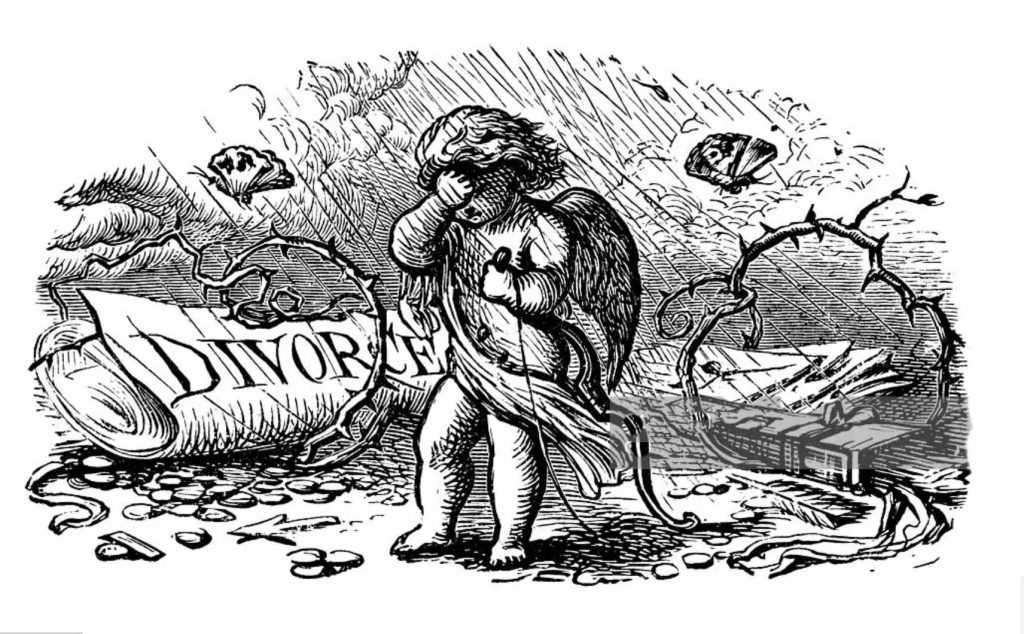
Cupid and Divorce
From Canadian Jewish News, 1982
Marriage may be likened to a city besieged: those without despair of getting in, those within despair of getting out. – Abraham Drayanov
I have often wondered who makes couples happier, the rabbis who marry them or the lawyers who obtain their divorce. But this sentiment notwithstanding, the smoothest of uncontested divorced proceedings is hardly a pleasant experience, for divorce court is not, after all, a very cheerful place.
In our day, a lawyer sitting in court on his own divorce is certainly not uncommon, although his professional experience provides him with a unique experience from which to reminisce. It is one of the ironies of our topsy turvy world that many lawyers who process numerous divorces on behalf of their clients little suspect that one day they should be engaged in their own.
Personal experience has served to confirm the wisdom of the practice of many lawyers never to counsel married clients to separate or divorce, for such a decision must remain a personal one. Sooner or later most people will look back on such a critical decision with some ambivalence and there should not be any grounds for a client placing any of the responsibility for the marital breakdown on his lawyer.
There are certain patterns, however, that over the years are discerned by lawyers conversant with divorce.
Almost invariably when a separation occurs but is followed by a resumption of cohabitation, as surely as night follows day, there will ultimately be a further and final separation further down the road.
 Recently, I acted for a woman in a divorce matter whose exceptional case goes to prove the rule. She had separated from her husband for the first and only time after 24 years of marriage, and when I asked her why she had never given consideration to a reconciliation, she advised that when a marriage reaches the critical juncture where the parties separate, it is akin to Humpty Dumpty falling off the wall.
Recently, I acted for a woman in a divorce matter whose exceptional case goes to prove the rule. She had separated from her husband for the first and only time after 24 years of marriage, and when I asked her why she had never given consideration to a reconciliation, she advised that when a marriage reaches the critical juncture where the parties separate, it is akin to Humpty Dumpty falling off the wall.
With the greatest of respect to marriage counsellors, it is indeed difficult ever to piece the marriage together again, even with the best of intentions. Yet most people do give it a valiant try, albeit with little success.
The longer a lawyer engages in divorce practice, the more apparent becomes the fallaciousness of the too often accepted truism that both spouses are responsible, to a greater or lesser extent, for the breakdown of the marriage.
There is a great number of people who suffer from severe psychoses or neuroses, and while their psychological problems may not prevent them from functioning in a work environment, within the context of a marriage their mental illness may make it virtually impossible for their spouse to get along with them.
Frequently, the only recourse for a normal spouse when this situation occurs, particularly at an early stage of the marriage and before there are any children, is to separate and ultimately divorce, for only a person with an abnormal need can tolerate what a normal person will find intolerable.
 I make exception, however, for the case where a spouse in need of psychiatric help is amenable to receiving it, yet it must still be realized that psychiatry, after all is said and done, is still a very imprecise science.
I make exception, however, for the case where a spouse in need of psychiatric help is amenable to receiving it, yet it must still be realized that psychiatry, after all is said and done, is still a very imprecise science.
A certain pattern also prevails when there are children involved. When spouses remain together purportedly for the sake of the children, this is a bad bargain at best, for the matrimonial discord usually ultimately ends in divorce, with the children being unhappy while the spouses are together and permanantly left with emotional scars after the spousal battles have ceased.
To sacrifice one’s happiness for the welfare of one’s offspring is often mere self-delusion, and the common lament of the spouses that have made this sacrificial devotion is that it was a fool’s bargain.
What advice would a lawyer then give to avoid all this matrimonial bloodshed? Sir Francis Bacon once said, “There was never proud man thought so absurdly well of himself as the lover doth of the person loved; and therefore it was well said, that it is impossible to love and to be wise.”
It is well and good to say that the acorn does not fall far from the tree, and therefore it is prudent to look at the proposed spouse’s parents and not assume that their faults have miraculously escaped one’s beloved . . . but one can look and not see.
There are also two commendable Yiddish proverbs that should be kept in mind by many an ardent suitor. “Too bad, the bride is so pretty,” and “A pretty face costs money.” It is regrettably difficult, however, to accept a community of interests and philosophies as a substitute for a pretty face, at least for those who are hopping aboard the matrimonial merry-go-round for their first twirl.
 An eminently successful client of mine, successful at business if not in matrimony, ascribes what he is today to his first wife with whom he lived for 20 years. A bad marriage can drive one to drink, to gambling, or to excessive work, and this particular client chose the latter. His former wife may indeed have indirectly made him what he is today, but one can only sympathize with such a horrendous motivation.
An eminently successful client of mine, successful at business if not in matrimony, ascribes what he is today to his first wife with whom he lived for 20 years. A bad marriage can drive one to drink, to gambling, or to excessive work, and this particular client chose the latter. His former wife may indeed have indirectly made him what he is today, but one can only sympathize with such a horrendous motivation.
In this age of liberalism and various family law reform acts, the opinion persists that women will still be the darlings of the court.
I am reminded of the connubial woes of an elderly survivor of the matrimonial wars who is currently in the throes of his third marriage, albeit with substantially less passion for the venerable institution . . . if not for his much younger wife. He is still paying, he says, for the privilege of having been married to his first mate, but his second spouse, he fondly relates, mercifully died.
As for his present wife who is but half his age, he unabashedly admits that he pacifies her with money, and is grateful that he is financially able to do so.
So much for ancient Yiddish proverbs and sage legal advice. ♦






